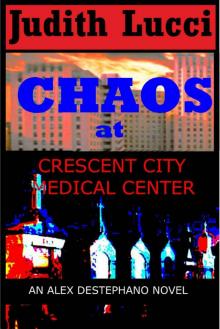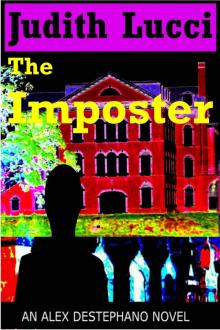- Home
- Judith Lucci
Chaos at Crescent City Medical Center (Alexandra Destephano Book 1)
Chaos at Crescent City Medical Center (Alexandra Destephano Book 1) Read online
Chaos At
Crescent City Medical Center
Also by Judith Lucci
Alex Destephano Novels
The Imposter
Viral Intent
Toxic New Year Spring
Finding St. Germaine (2016)
Others Books
Ebola: What You Must Know to Stay Safe
Meandering, Musing & Inspiration for the Soul
Chaos At
Crescent City Medical Center
A NOVEL BY
JUDITH LUCCI
Copyright © 2012 by Judith Lucci
All rights reserved. No part of this book may be reproduced in any form or by any electronic or mechanical means, including information storage and retrieval systems, without permission in writing from the author, except by a reviewer who may quote brief passages in a review.
The characters and events in this book are fictitious. Any similarity to real persons, living or dead, is coincidental and not intended by the author.
ISBN-13: 978-1512271638
ISBN-10:1512271632
Book design by Eric Blumensen
Printed in the United States of America
Acknowledgements
Seeing this novel in print will be the culmination of many years of dreaming and hard work. I could write 300 pages simply listing and thanking the people who have helped me pursue this dream. First of all, I would like to thank my huge circle of family, friends and former and current students for their support of my writing and their reassurances that Chaos at Crescent City Medical Center was a great novel and would be published. I would like to thank Dr. Sherry Sandkam of Richmond, VA who encouraged me many years ago to pursue my dream of writing and spent many hours reviewing my work. I would like to recognize and thank Dr. Anne Horrigan, an awesome emergency department nurse who was a technical advisor for me during the emergency department shoot-out, Dr. Julie Strunk, a faculty member at James Madison University who assisted me with the final editing of the novel, and Captain Bill Lange (ret) of the Henrico County Fire Department who consulted with me about electrical fires and injuries. Additionally, I want to express my sincere gratitude to all of my wonderful friends who have encouraged me over the years. I would also like to thank my good friend Eric Blumensen for his encouragement and assistance throughout this process. With Eric's assistance and editing, this book is finally a reality.
About the Author
Judith Lucci is from Virginia and holds graduate and doctoral degrees from Virginia Commonwealth University and the University of Virginia. She has been a practicing clinical nurse for over 25 years and is currently a professor of Nursing at a Virginia University. She is the author of numerous academic and health-related articles and documents. When not teaching or writing, Judith is an avid silk painter and multi-media artist. She divides her time between the Shenandoah Valley of Virginia and the Mississippi Gulf Coast.
Table of Contents
Chapter 1
Chapter 2
Chapter 3
Chapter 4
Chapter 5
Chapter 6
Chapter 7
Chapter 8
Chapter 9
Chapter 10
Chapter 11
Chapter 12
Chapter 13
Chapter 14
Chapter 15
Chapter 16
Chapter 17
Chapter 18
Chapter 19
Chapter 20
Chapter 21
Chapter 22
Chapter 23
Chapter 24
Epilogue
Chapter 1
The pungent smell of Cajun spices permeated the February New Orleans air. With only one week before Carnival, the French Quarter was blazing with activity. Ornate iron balconies bowed under the weight of dozens of people, pressed together tightly for a better look at the street below. Being "up" on a balcony during Mardi Gras was prestigious, giving one an immense sense of power and control over the crowd below. You could get people in the streets to do just about anything for a Mardi Gras "throw" -- a string of plastic beads or an aluminum doubloon.
Raoul Dupree, a waiter at Tujague's Restaurant, was smoking outside the door of the European-styled bistro. His eyes were riveted on a gorgeous man hanging over a balcony a few doors down. The man was teasing a lovely, but drunken young woman in the street. The man fingered a string of cheap gold beads in front of her and repeated "show your tits" continuously. Others on the balcony picked up the chant, and it became louder and louder, almost deafening.
The young woman kept reaching for the gold beads, just to have them snatched from her grasp each time. She looked around and smiled drunkenly and benignly at the large crowds gathered nearby and above on the balconies.
The man was smiling at her, taunting her and luring her to the beads. The chant had become louder and frenzied. Crowds on the street and adjoining balconies were wildly excited and picked up the rhythm, hollering, clapping, and stamping their feet.
Finally, in the flick of an instant, the young woman pulled up her white T-shirt exposing her perfectly shaped breasts. The crowd went wild, clapping and shouting with approval. The woman grabbed her beads held them up for the crowd and quickly disappeared into an alley.
Raoul smiled and shook his head. Mardi Gras still amazed him. After a lifetime of Carnival seasons, he still wasn't used to the heavy partying, drunken and lewd behavior so common during the season. People would do anything for a Mardi Gras trinket. He shrugged his frail shoulders as his eyes again located the handsome man just as a hand reached out and roughly grabbed Raoul’s blond hair and shoulder. Startled, Raoul looked around quickly and saw the flushed face of the frowning Tujague’s maitre d' come bouncer.
"Your boys in the private booth are getting anxious, Raoul. Better get your skinny ass up there and keep ‘em happy. We don't want any of those sons of bitches on our bad side," said the burly maitre d', gesturing toward the door.
Raoul stamped out his cigarette butt, grimaced, and ran up two flights of steps to a private dining room where three men sat smoking after a long lunch. Tujague’s, the oldest restaurant in the French Quarter, had a reputation for privacy and discretion, and was a meeting place for prominent New Orleanians engaged in all sorts of business, legal and illegal. Privacy, circumspect service, and seven-course prix fixe dinners made the restaurant a favorite.
The men were talking quietly as Raoul loitered outside the dining room. One glance at the group convinced him not to interrupt. He recognized one man, but he'd never seen the others and wondered how they were connected. From what he'd observed, he didn’t think they knew each other well and doubted if they'd ever been together before. They didn't seem to mix. After cocktails and several bottles of wine, the tone of their conversation had moved from strained politeness to menacing. The maitre d' had wasted no words when he'd told Raoul to stay out of the room except to serve. Each time he'd entered the private booth conversation stopped.
The man Raoul recognized was Frederico Petrelli, better known as “Rico” and reputedly a mob boss from Chicago who'd recently moved to New Orleans to oversee the "Dixie Mafia's" activities in the Riverboat and land gambling operations. Raoul knew Rico because he often dined at Tujague’s and usually had his special waiter, Matthew. Unfortunately, Matthew was off today due to injuries he'd received last week.
Raoul kept his distance as he eyed the group and decided he never wanted to run up against Frederico. He was in his mid-fifties, balding and at least 40 pounds overweight. He had a long irregular scar on his right forearm,
and dark beady eyes. He glared at his companions with distrust and impatience. His thick-pursed lips moved back and forth over a wet cigar in his mouth. Frederico was a classic picture of a vicious Chicago mafia boss.
The second man was also distinctive but in a different manner than the gangster. This man was tall, with a swarthy complexion and dark oiled hair, pulled back into a ponytail. He had a long face with an aquiline nose and thin lips that seemed to curl in a permanent smirk. His eyes were strange, the color a blackish-yellow, and they gave the man a sinister appearance. It was impossible to tell his age. He could be anywhere between 30 and 60. His body was big, well-proportioned and in perfect shape.
Raoul was sure about this because he spent most of his time visually undressing men and he could easily imagine the man’s six-pack abs. His clothes were expensive, as was the gold medallion hanging around his neck. He wore dark trousers and a custom-designed dark shirt opened at the neck. He caressed a leather strap in his lap as if it were his lover as he alternately tapped his well-manicured nails against the hand-rubbed walnut table. His dark eyes moved side to side as he followed the conversation between the other two men. His eyes were unreadable and gave him a menacing and evil appearance.
Raoul's attention was drawn again to the leather strap in the ponytailed man's lap being continually stroked. The ponytailed stranger said little, instead following the conversation between Frederico and the third man. He gave Raoul the creeps, and Raoul rubbed away the chill bumps that had appeared on his arms. Raoul shuddered, thinking the man looked like the devil with those yellow-black eyes and dubbed him “the evil one”.
The third man was less distinctive. Raoul wouldn't have paid much attention to him had his companions not been so macabre. The third man was about 40 years old with brown hair and an honest face. He spoke with a Midwest accent and seemed ordinary. The ordinary man was speaking when Frederico summoned Raoul into the dining room. Frederico rudely interrupted him.
"Give us sambukas all the way around. Also, a pot of espresso, and get the fuck out of here," Frederico barked at Raoul.
Raoul left quickly but heard something that made him freeze within earshot.
The ordinary man said, “Don’t care what you do. I want Robert Bonnet ruined and dead. I don't know what your interests are in the Bonnets and the medical center, but I want the man dead. He killed my wife and baby three years ago. Kill him.”
Raoul's ears picked up at the mention of Robert Bonnet. He knew Dr. Bonnet from the medical center where he worked as a volunteer on the AIDS floor. Dr. Bonnet had operated on his lover last year when other surgeons had declined. Dr. Bonnet hadn't cared that Josh had AIDS and would probably die anyway but had pulled strings to give Josh a chance to get a new liver and live longer. He'd given Josh a lot of comfort before he had died. Hearing threats against Dr. Bonnet encouraged Raoul to take a risk, and he paused for a moment longer, eavesdropping outside the room.
Frederico glared at the third man with a bored expression and said harshly, "Shut up, choir boy. No time for emotions. They get in the way of business and cause mistakes. No mistakes, you hear?" The gangster’s voice had become low and threatening as he glared at the ordinary man. "You make a mistake, you pay."
The ordinary man, frantic, stared at him.
The evil one with the ponytail simply nodded his head and said, "Salute," and raised his cup in a toast.
Rico continued to glare at the ordinary man and said, "Get it choir boy, no mistakes. You know what to do."
The ordinary man nodded.
Raoul returned to the serving area, his heart thudding heavily in his chest.
Chapter 2
"You’ve got to handle this, dammit, Alex. You do treat Robert Bonnet differently from the other staff physicians. This is the third complaint we've received against him in less than six months. You must do something. That, as lawyer for this medical center, is your responsibility."
Alexandra Lee Destephano sat on the edge of the sofa as she listened to her boss rant and rage. Don Montgomery was the chief executive officer at Crescent City Medical Center. Dissociating herself from his tirade, she glanced around the executive office. The office was stiff, formal, and uncomfortable and the décor mirrored the pretentious nature of Crescent City Medical Center’s haughty CEO. In fact, there was a likeness between the man and the office. Don Montgomery was tall and stiff in his Versace suit and Louis Vuitton watch. His thinning brown hair framed his cold unsmiling, face.
He looks like a fish Alex thought, but she returned to reality as he closed the distance between them and entered her personal space. Alex rose from the sofa and backed away from him. Overlooking the sarcasm in her boss's voice, she prayed for patience and remembered the advice of her maternal grandmother, Kathryn Rosseau Lee of Virginia.
Alex struggled for control and responded, "Why don't we take a few minutes to review these claims and see if we do have anything serious against the hospital? I am not convinced that we do." Alex watched the frown flicker across Don's impassive face.
The CEO stood up, walked to his office door, and opened it. “I don’t have time and that is not my job. I’m up to my ass in Obamacare bullshit regulations that are going to cost us millions, absolute millions, and I don’t have time to discuss your ex-husband’s inability to practice safe medicine. If you're going to play ball with the big boys, you'll just have to figure out how or get out.”
Alex could feel anger seeping through her brain and tried hard not to roll her eyes as Don continued his self-aggrandizing.
“Don’t forget that I run this hospital. The financial success, image, and future of this place are my responsibility. I have to second-guess our competition and keep our market edge. No one here has any of the skills needed to assist me. Were it not for my leadership, the board of trustees would have voted for that Health Trust merger six months ago."
Alex was sick to death of Don’s proclaimed “Savior Behavior” and wondered if he lived in a vacuum. She doubted he realized the efforts of the physicians, staff, and volunteers were part of the success of the world-class and prestigious Crescent City Medical Center. Don consistently took credit for all accomplishments at CCMC and cast blame on others when things went wrong. She sighed as the CEO continued eulogizing himself.
"If I didn't have a handle on internal and external sabotage we encounter daily, we'd be history. Only the best hospitals and medical centers with strong leadership will survive these times, but I can't do it all." Don paused for a moment and then shook his finger in her face. "Now, take care of this problem immediately, dammit. I expect a report from you within twenty-four hours about how you're going to handle the malpractice claims against Robert Bonnet."
Alex was angry at the CEO's disrespect and patronizing superiority but held her temper. "I'll meet with Dr. Bonnet and the staff involved this week."
As she left the office, her self-control intact, Alex wondered how many executives would she have to train. Don Montgomery was already the second CEO in her two-year tenure as in-house legal counsel for Crescent City Medical Center. She was beginning to wonder if she'd be able to stand it for another two years. Alex constantly wondered if she'd made the right decision in moving to New Orleans to practice hospital law. In all honesty, she wondered if she treated Robert Bonnet, her ex-husband, differently from other CCMC physicians. Sometimes feelings of uncertainty and guilt clouded her mind, and she hoped it didn't cloud her professional judgment as well. Alex’s thoughts returned to Robert as she left the executive offices and headed toward her own, continuing to think about Robert along the way.
Robert Henri Bonnet, M.D., was the chief of surgery at CCMC and a favored son of New Orleans. Alex knew that Robert was a skillful physician. They'd met over ten years ago at the University of Virginia in Charlottesville, when Robert was a resident in general surgery, and she was a doctoral student in clinical nursing. They dated less than a year before they married in a very small but circumspect ceremony at the UVA Chapel on the Lawn. Their
union melded two of the most powerful families in the South -- the aristocratic Bonnets’ of Louisiana and the powerful Lees’ of Virginia.
Her musings led her through the opulent atrium of the world-famous hospital into the Hospital Café where she ordered a Latte and continued to think about her failed marriage. The marriage to Robert had been perfect in the early years, and she still wondered when things had gone wrong. In truth, Alex rarely saw Robert at CCMC and knew little about his personal life. She was curious about Don’s angst towards him. Her intuition suggested that something was involved but she wasn’t sure what it was.
Alex reflected on her meeting with Don as she slowly sipped her coffee. Other physicians at CCMC presented greater legal risks. For instance, her greatest concern was the hospital's internationally famous vascular surgeon who allowed his physician's assistant to perform complex aspects of cardiac surgery. Another concern centered on CCMC's nationally known cancer physician whom Alex suspected of practicing active euthanasia. She considered these physicians much more dangerous than a few complaints about Robert.
Alex had considered her former relationship with Robert prior to accepting employment at CCMC. Their divorce had been final for four years, and their parting had been amicable. Much of their difficulty had centered on Alex's decision to go to law school and postpone having children until she established a law practice. Robert, a product of a traditional home, didn't like the idea of a professional wife who worked outside the home. Over the duration of their marriage, their individual lives took separate paths -- Robert's in medicine and Alex's in law. The decision to end the marriage was mutual although Alex believed two miscarriages, during her third year of law school, were the major reason Robert divorced her. Robert had wanted her to quit school at the onset of the second pregnancy, but Alex had refused, noting that she was healthy and too close to graduation. Robert had become depressed when she again miscarried. After several months, he announced he was ending the marriage. He had moved out of their home shortly afterward and filed for divorce.

 The Most Slippery Crime of the Year: Death On The Slopes: A Massanutten Tale (The Artzy Chicks Book 4)
The Most Slippery Crime of the Year: Death On The Slopes: A Massanutten Tale (The Artzy Chicks Book 4) Crescent City Chronicles (Books 1-3)
Crescent City Chronicles (Books 1-3) Viral Intent: An Alexandra Destephano Novel Book #3
Viral Intent: An Alexandra Destephano Novel Book #3 Toxic New Year: The Day That Wouldn't End: The Day That Wouldn't End (Alex Desephano Series Book 4)
Toxic New Year: The Day That Wouldn't End: The Day That Wouldn't End (Alex Desephano Series Book 4) Chaos at Crescent City Medical Center (Alexandra Destephano Book 1)
Chaos at Crescent City Medical Center (Alexandra Destephano Book 1) The Imposter (Alexandra Destephano Book 2)
The Imposter (Alexandra Destephano Book 2)